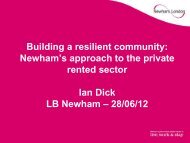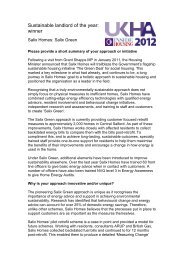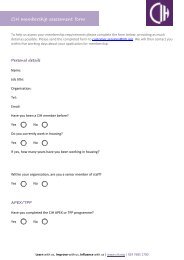View publication - Chartered Institute of Housing
View publication - Chartered Institute of Housing
View publication - Chartered Institute of Housing
You also want an ePaper? Increase the reach of your titles
YUMPU automatically turns print PDFs into web optimized ePapers that Google loves.
LEARNING…SO WHAT’S CHANGING?<br />
and revenue shortages. This is known as ‘Red Ocean’ thinking and it has its place, but<br />
should it be at the expense ‘Blue Ocean’ solutions which aim to creatively look at adding<br />
value to what we do?<br />
High value solutions are <strong>of</strong>ten born out <strong>of</strong> new and different thinking but few<br />
organisations view creativity and innovation as an essential organisational competence<br />
which is explicit and embedded in the way the business is run. Without embedded<br />
creativity we are anchored in the ways <strong>of</strong> the past and we are slow to respond and<br />
improve people’s lives.<br />
INSIGHT number two – Whole person learning is essential…<br />
for fulfilment and success<br />
It used to be a popular 20th Century adage that for many people organisational life<br />
amounted to ‘hanging up their brain with their coat’ as they went into work. Thankfully<br />
the 21st Century has seen gradual recognition by successive UK governments <strong>of</strong> the<br />
importance <strong>of</strong> people engagement at work. This was exemplified by the Macleod report<br />
which makes a compelling case for the importance <strong>of</strong> psychological ownership <strong>of</strong> work<br />
and the emotional engagement <strong>of</strong> people in their work.<br />
The real gains in productivity, efficiency and creativity derive from greater psychological<br />
engagement. This means seeing people in ‘whole person’ terms. It begins to recognise<br />
that when personal values, emotions and thinking align with the needs <strong>of</strong> the business<br />
there is a powerful psychological contract which goes far beyond the wage/effort<br />
equation. <strong>View</strong>ing staff in ‘whole person’ terms and helping them align with a cause<br />
based on an organisation’s vision requires leaders who are emotionally intelligent and<br />
skilled at making the most <strong>of</strong> their people.<br />
Show me an organisation in which the vast majority <strong>of</strong> leaders hold regular and<br />
meaningful one-to-ones with their staff, in which both work and personal issues are<br />
openly addressed, and I will guarantee a high performing staff team and organisation.<br />
The vast majority <strong>of</strong> people want to align and emotionally engage with their<br />
organisation. It is not a simplification to say that many people leave an organisation<br />
because <strong>of</strong> their boss!<br />
INSIGHT number three – Left and right brain thinking are required in<br />
the 21st Century<br />
Managerial sophistication in the late 20th Century was exemplified by the growth in<br />
university business schools and MBAs. Many <strong>of</strong> these postgraduate qualifications were<br />
based on ‘left brain’ thinking which means it prioritised logical, fact-based, analytical<br />
73

















